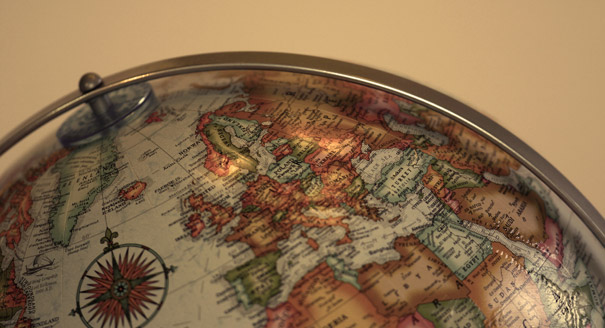As European leadership prepares for the sixteenth EU-India Summit, both sides must reckon with trade-offs in order to secure a mutually beneficial Free Trade Agreement.
Dinakar Peri
{
"authors": [
"Jan Techau"
],
"type": "commentary",
"blog": "Strategic Europe",
"centerAffiliationAll": "",
"centers": [
"Carnegie Endowment for International Peace",
"Carnegie Europe"
],
"collections": [],
"englishNewsletterAll": "",
"nonEnglishNewsletterAll": "",
"primaryCenter": "Carnegie Europe",
"programAffiliation": "",
"programs": [],
"projects": [],
"regions": [
"Europe"
],
"topics": [
"EU"
]
}
Robert Kaplan, author of “The Revenge of Geography,” brilliantly explains the theory of geopolitics, but fails to apply it convincingly.
The analytical discipline of geopolitics is the Kate Moss of international relations: an old idea that continues to be en vogue, never quite loses its strange, roguish beauty, can be applied to anything, has a whiff of the excitingly illicit and dangerous, and enjoys instant name recognition around the globe. People either love it or hate it. But everybody likes to watch and then watch some more.
Critics see the geopolitical view of the world as deterministic and ignorant of man as the prime shaper of society and history. Aficionados explain that the long-term behavioral patterns of peoples, societies, and nations cannot be understood without a look at the map and a proper understanding of the physical surroundings that shape human interaction.
The intellectual concept of geopolitics originated in Europe, yet it is here that it is most unpopular today. It smacks of the ugly realism that many Europeans find so difficult to embrace. And it is too disquieting a reminder that history has not ended, and that the current peaceful state of the continent may not last forever.
As the fiscal and economic crisis fuels the discussion about the future of Europe, long-term projections into the future have become fashionable in European capitals. In most scenarios, economic analysis prevails, while very little attention is given to the underlying factors that a geopolitical analyst would put center stage. This is reason enough to have a closer look at what Robert Kaplan, journalist, Stratfor frontman, and the high priest of contemporary geopolitics, has to say about Europe in his much-discussed book "The Revenge of Geography".
The book, part (excellent) primer on the discipline of geopolitics, part prognosticating tour d'horizon of the world's geopolitical regions of eminence, dedicates only 20 pages (including four pages of maps) to the old world. Amid lots of familiar material, they offer a few pertinent and smart observations about European history. Kaplan's look into the future identifies three decisive factors for Europe's development:
The first is the power shift away from the currently ruling "Carolingian Europe" of the EU integration process to Germany, the new powerhouse of Europe. Second comes the question of whether Germany, in concert with its smaller Central European neighbors, will take a decisive stand against Russia and its traditional tendencies to use Mitteleuropa as its buffer zone against the West. The third issues is whether Greece, given its strategically invaluable location, will stay firmly in the Western camp and not side with Russia, to which it is drawn by religious and cultural tradition.
As is often the case with geopolitics, this analysis contains just enough truth to be interesting, but not enough substance to be really relevant. The Europe chapter contains many beautifully sweeping generalizations that are hard to disagree with, while leaving the reader gravely dissatisfied with the actual substance. Upon closer look, many of the arguments that Kaplan builds on to describe patterns of historic development are eclectic. He lines up facts and truisms to create a mushy sense of politically fatefulness. Here is rather typical example from Kaplan’s Europe chapter:
"Greece, of all places, will provide an insightful register of the health of the European project. Greece is the only part of the Balkans accessible on several seabords to the Mediterranean, and thus is the unifier of two European worlds. Greece is geographically equidistant between Brussels and Moscow, and is as close to Russia culturally as it is to Europe, by virtue of its Eastern Orthodox Christianity, in turn a legacy of Byzantium. [...] Greece, going back to antiquity, is where Europe —and by inference the West—both ends and begins. The war that Herodotus chronicled between Greece and Persia established a "dichotomy" of West against East that persisted for millennia. [...] Greece, as Mackinder writes, lies just outside the Eurasian Heartland and is thus accessible to sea power. But possession of Greece in some form by a Heartland power (namely Russia) 'would probably carry with it the control of the World Island'."
This is such an artfully composed combination of truisms, simplifications, unsubstantiated claims, the vernacular of international relations theory and historical insinuation that it actually reads quite fluently without ever revealing what it is supposed to prove. Contrary to the author's obvious intention, it does not prove that the fate of Greece is a geopolitical question of life or death for Europe. Maybe that can be proven somehow, but certainly not this way.
On Germany's key role in Europe's future, Kaplan is, of course, right. His instincts point him in the right direction when he writes that "a critical factor [...] will be the degree to which European, and particularly German, quasi-pacifism holds up in the future." But Kaplan applies this mostly to a potential revival of the antagonism with Russia, but not at all to Europe's wider role as a strategic player in the world. Yet this is a much more important question for the survival of the fully globalized, import/export-driven societies of the old world.
Furthermore, Kaplan does not mention that due to demographic trends, Germany's elevated power position in Europe might actually be rather short-lived. According to some projections, both Britain and France will surpass Germany's population in the not-so-distant future. Finally, in his entire geopolitical analysis of Europe, Kaplan makes no mention of the United States. Admittedly, America is not a European power geographically, but of course it is so economically, politically, and militarily. It is curious that the United States' interest in a safe and stable European countercoast (a very quintessential geopolitical concept) is not mentioned even once. Any geopolitical analysis of Europe that does not appreciate the United States’ strong role must miss a few very decisive points. Besides, it is open to debate whether Europeans are really as pacifist as Kaplan wants us to believe. European history since 1945 can be interpreted very differently.
Kaplan's book is a double-faced phenomenon. Its introductory chapters make a splendid and well-founded case for geopolitics as a relevant (and intellectually beautiful) analytical framework for the study of international affairs. But in applying this framework to actual cases, Kaplan falls short. None of his case studies are truly convincing. Most of them, such as the appallingly cliché-ridden chapter on Russia, are even less compelling than his writing on Europe. It is a tragic that Kaplan himself, in the second half of his book, undermines the very system he so skilfully introduces in the beginning. A truly useful geopolitical analysis of Europe in the early 21st century still remains to be written. In the first chapters of his book, Kaplan proves that it can be done. There is an urgent need for it, if only to finally reinstate geopolitics' reputation as a credible analytical tool in the European foreign policy debate.
As European leadership prepares for the sixteenth EU-India Summit, both sides must reckon with trade-offs in order to secure a mutually beneficial Free Trade Agreement.

Dinakar Peri
The hyper-personalized new version of global sphere-of-influence politics that Donald Trump wants will fail, as it did for Russia. In the meantime, Europe must still deal with a disruptive former ally determined to break the rules.

Thomas de Waal
2026 has started in crisis, as the actions of unpredictable leaders shape an increasingly volatile global environment. To shift from crisis response to strategic foresight, what under-the-radar issues should the EU prepare for in the coming year?

Thomas de Waal
A renewal of relations between France and Turkey is vital to strengthen European strategic autonomy. To make this détente a reality, Paris and Ankara should move beyond personal friction and jointly engage with questions of Black Sea security.

Romain Le Quiniou
Europe is designing a new model of collective security that no longer relies on the United States. For this effort to succeed, solidarity between member states that have different threat perceptions is vital.

Erik Jones